You’ve Reached a 404 Page
Something’s gone wrong, but not for the reasons you think.

No Slate exists at the address you entered or the link you clicked. Consider checking out our homepage or most recent published pieces, which should work just fine.